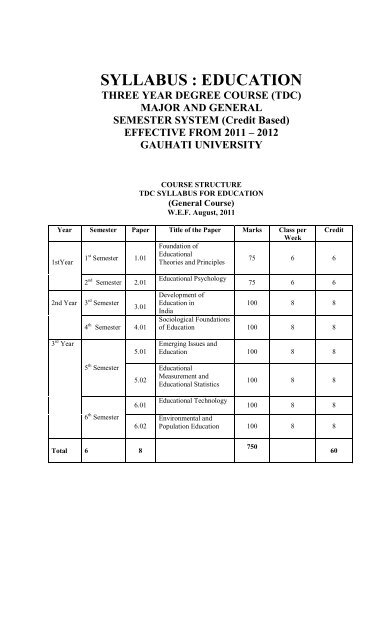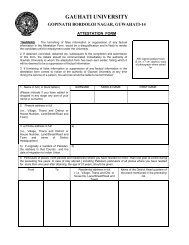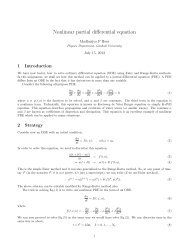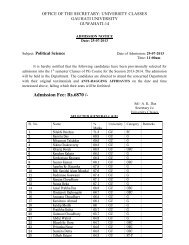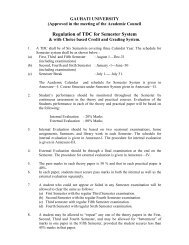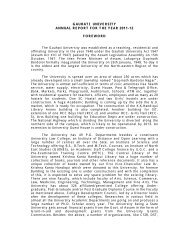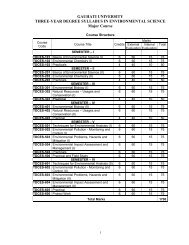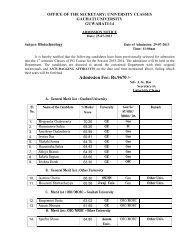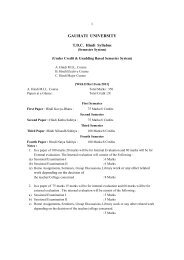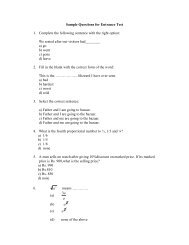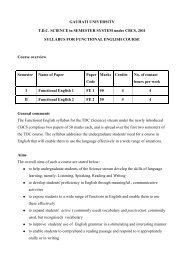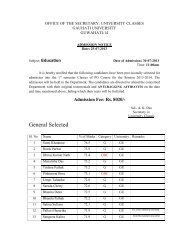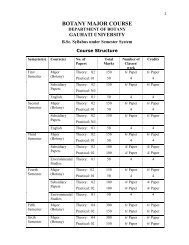SYLLABUS : EDUCATION - Gauhati University
SYLLABUS : EDUCATION - Gauhati University
SYLLABUS : EDUCATION - Gauhati University
You also want an ePaper? Increase the reach of your titles
YUMPU automatically turns print PDFs into web optimized ePapers that Google loves.
<strong>SYLLABUS</strong> : <strong>EDUCATION</strong><br />
THREE YEAR DEGREE COURSE (TDC)<br />
MAJOR AND GENERAL<br />
SEMESTER SYSTEM (Credit Based)<br />
EFFECTIVE FROM 2011 – 2012<br />
GAUHATI UNIVERSITY<br />
COURSE STRUCTURE<br />
TDC <strong>SYLLABUS</strong> FOR <strong>EDUCATION</strong><br />
(General Course)<br />
W.E.F. August, 2011<br />
Year Semester Paper Title of the Paper Marks Class per Credit<br />
Week<br />
Foundation of<br />
1 st Educational<br />
Semester 1.01<br />
1stYear<br />
Theories and Principles<br />
75 6 6<br />
2nd Year<br />
3 rd Year<br />
2 nd Semester 2.01<br />
3 rd Semester<br />
3.01<br />
4 th Semester 4.01<br />
5.01<br />
Educational Psychology<br />
75 6 6<br />
Development of<br />
Education in<br />
India<br />
100 8 8<br />
Sociological Foundations<br />
of Education 100 8 8<br />
Emerging Issues and<br />
Education 100 8 8<br />
5 th Semester<br />
5.02<br />
Educational<br />
Measurement and<br />
Educational Statistics<br />
100 8 8<br />
6 th Semester<br />
6.01<br />
6.02<br />
Educational Technology<br />
100 8 8<br />
Environmental and<br />
Population Education 100 8 8<br />
Total 6 8<br />
750<br />
60
Foundation of Educational<br />
Theories and Principles<br />
Paper: 1.01 (Credits-6)<br />
(General Course)<br />
Objectives :<br />
1) To be acquainted with scientific and sound principles and theories of education.<br />
2) To understand the concept, nature and scope of education.<br />
3) To gain knowledge about different aims of education.<br />
4) To be familiarized with different dimensions of Education such as the learner, the<br />
teacher and the curriculum.<br />
5) To acquire knowledge about the concept of discipline and freedom.<br />
6) To expose the students to modern trends of education – particularly value education.<br />
Unit: 1: Meaning, Concept and Scope of Education<br />
Meaning of Education<br />
Definition of Education<br />
Nature of education-Education as a process and product<br />
Scope of Education<br />
Unit-2: Aims and Objective of Education<br />
Importance of Aims of Education Determinants of aims<br />
Individual and Social aim of Education<br />
Cultural and Vocational aim,<br />
Democratic aims<br />
Unit: 3: Forms of Education<br />
Formal Education: School- Functions and responsibility of School, relation ship<br />
between school and society.<br />
Informal education: Educational role of family, Social institution-religious<br />
institutions, state.<br />
Non formal Education –Distance and open education.<br />
Unit: 4: Dimensions of education<br />
The Learner–Its innate endowment and environment, Learner-Centered Education<br />
The teacher-Qualities and responsibilities<br />
The Curriculum-Meaning and concept, Need and importance, Principles of<br />
curriculum construction, Co-curricular activities-definition, types and importance<br />
Unit: 5: Discipline and freedom –<br />
Meaning, concept and need of discipline,<br />
Discipline and order,<br />
free-discipline,<br />
Maintenance of school discipline-problems and means.<br />
Unit: 6: Value education –<br />
Meaning of human values and their determinants<br />
Different Types of values<br />
Need and Importance of value Education<br />
Realization of values through Education –Role of family, school and teachers<br />
Reference Books :<br />
1) Safaya and Saiyda– Educational Theory and Practice<br />
2) Ross J.S. – The Ground Work of Educational Theory.<br />
3) Banerjee, A — Philosophy and Principles of Education, Kolkatta, B.B. Kundus and<br />
Sons.<br />
4) Passi, B.K. and Singh, P — Value Education, Agra, H.P. Bhargava Book House.<br />
5) Âõ1n¸»± ûîÂÏò - ¿úŽÂ±îÂQ, &»±ýÃñéÂÏ ùûþ±äǼ<br />
6) ö±á»îÂÏ, ¿òùÏ÷± Õ±1n¸ üýÃÃËû±áÏüßÁù Ð òîÅÂò<br />
¿úŽÂ±îÂQ¼
Educational Psychology<br />
Paper: 2.01 (Credits-6)<br />
(General Course)<br />
Objectives :<br />
1) To enable the students to understand the relation between education and psychology and<br />
different methods of educational psychology.<br />
2) To enable the students to understand learning process, memory, attention, instinct and<br />
emotion.<br />
3) To acquaint the students with the concept of personality, type and trait theories.<br />
4) To understand the concept of intelligence - nature and different theories.<br />
Unit-1: Psychology and Education<br />
Educational Psychology -its meaning and definitions.<br />
Relation between education and psychology,<br />
Scope of educational psychology.<br />
Methods of educational psychology –Introspection, observation and experimentation,<br />
Application of educational psychology in teaching and learning process<br />
Unit-2: Learning<br />
Learning –Meaning and nature of learning,<br />
Theories of learning – Connectionism-trial and error & Laws of Learning, Conditioning –<br />
classical conditioning and operant conditioning, Gestalt theory-learning by insight,<br />
Motivation and learning<br />
Unit-3: Memory and Attention and Interest<br />
Meaning and types of memory,<br />
Marks of good memory,<br />
Economic methods of memorization,<br />
Forgetting and its causes<br />
Attention-meaning and concept, types and determinants ,<br />
Interest –meaning and conditions.<br />
Educational implication of attention and interest.<br />
Unit-4:- Instinct and emotion<br />
Instinct –Meaning, concept, modification of instinct,<br />
Emotion –meaning and concept,<br />
Place of instinct and emotion in education<br />
Unit-5: Personality,<br />
Meaning of personality<br />
Type and trait theories –type theory -Seldon and Jung<br />
Trait theory-Adler<br />
Unit-6; Intelligence<br />
Meaning of Intelligence , concept, definition, nature,<br />
Theories- two factors theory, Multifactor theory, Group factors theory.<br />
Reference Books :<br />
1) Skinner, Charles E. – Educational Psychology<br />
2) Hunt, M.P. – Psychological Foundations of Education.<br />
3) Whittakar – Introduction to Psychology.<br />
4) Safaya, R.N, Shukla, C.S and Bhatia, B.D. – Modern Educational Psychology<br />
5) Âõ1n¸»±, ûîÂÏò - ¿úŽÂ± ÷Ëò±¿Âõ:±ò¼
Development of Education in India<br />
Paper: 3.01 (Credits-8)<br />
(General Course)<br />
Objectives :<br />
1) To acquaint the students with the ancient and medieval system of education in India.<br />
2) To help the students to understand the development of education in India during the British<br />
Period.<br />
3) To acquaint the students with the development of education in India during post<br />
independence period.<br />
4) To acquaint the students with the development of education in Assam.<br />
Unit- 1<br />
<br />
<br />
A synoptic view of ancient and medieval system of education<br />
A synoptic view of educational activities of christian missionaries and<br />
East India Company<br />
Unit- 2<br />
Charter Act of 1813,<br />
Macaulay Minutes<br />
Bentinck’s Resolution of 1835<br />
Woods Despatch-1854<br />
Unit- 3<br />
<br />
<br />
<br />
Indian Education Commission -1882 and its impact on the subsequent development of<br />
education.<br />
Lord Curzon’s Educational Policy-1904-Secondary and <strong>University</strong> Education.<br />
Growth of national consciousness and National movement and its impact in education with<br />
reference to Gokhales Bill.<br />
Unit- 4<br />
Saldler Commission Report-1917- Secondary and <strong>University</strong> Education.<br />
Wardha scheme of education-1937.<br />
Sargent report-1944.<br />
Unit--5<br />
Constitutional provision of Indian Education,<br />
Radhakrishnan Commission-1948-Aims of <strong>University</strong> education and the impact of<br />
recommendations on Aims.<br />
Unit- 6<br />
<br />
<br />
Recommendations of Secondary Education Commission (Mudaliar Commission-1953)<br />
Organizations, Curriculum, Examination and impact on subsequent development.<br />
Recommendations of Education Commission (Kothari Commission 1964-66) Objectives and<br />
structure of Education.<br />
Unit- 7<br />
National policy on education 1986–Objectives, main features,<br />
Revision of NPE - Ramamurti Review Committee 1990.<br />
Janardhana Reddy Committee 1991-92.<br />
Unit-8<br />
Development of education in Assam.<br />
Primary Education<br />
Secondary Education.<br />
<strong>University</strong> Education.<br />
Women Education.<br />
Reference Books :<br />
1) Nurullah, S and Naik – A Students History of Education in India, Macmillian.<br />
2) Safaya and Saiyda – Development, Planning and Problems of Indian Education, New Delhi<br />
– Dhanpat Roy and Sons.<br />
3) Rao, K. Sudha- Educational Policies in India Analysis and Review of Promise and<br />
Performance – NUEPA 2009.<br />
4) Âõ1n¸»±, ûîÂÏò - ö±1îÂ1 ¿úŽÂ±1 ý×ÃÿîÂýÃñü1<br />
ÕñÉûþò, &»±ýÃñéÂÏ ùûþ±äǼ<br />
5) ÎðûÏ, Î1íÅ - ö±1îÂ1 ¿úŽÂ± ý×ÃÿîÂýÃñü¼<br />
6) Âõ1ðÃÍù, ðÃMÃà ÕæÃL± - ö±1îÂ1 ¿úŽÂ± ÂõÅ1?Ï,<br />
&»±ýÃñéÂÏ ùûþ±äǼ
Sociological Foundations of Education<br />
Paper: 4.01 (Credits-8)<br />
(General Course)<br />
Objectives :<br />
1) To acquaint the students with education as a social process.<br />
2) To inculcate the knowledge of Education from the social perspective.<br />
3) To understand education as a determinant of social change and development.<br />
4) To develop social habits and attitudes in the students and to make them socially adjustable.<br />
Unit: 1 Education and Sociology :<br />
Educational sociology-meaning, nature, scope,<br />
Need and importance of sociological approach in education,<br />
Educational sociology and Sociology of education<br />
Unit: 2 Social group and Leadership :<br />
Social group—definitions characteristics and classifications,<br />
Social interactions and their educational implications,<br />
Group dynamics,<br />
Leadership –role of education in leadership training.<br />
Unit: 3— Education and society :<br />
Education--<br />
as a social system,<br />
as a socialization process,<br />
as a process of social progress<br />
as a process of social control<br />
Unit: 4 Education and social change :<br />
Education and social change – its meaning and concept,<br />
Agencies of social change,<br />
Education as a factor of social change with special reference to India<br />
Unit: 5 Social Organization-disorganization:<br />
Social Organization-its concept,<br />
Factors influencing social organization-folkways, mores and their educational implications.<br />
Social Disorganization-types, causes, prevention.<br />
Unit: 6 Culture and Education :<br />
Culture – Meaning, definition, nature and importance.<br />
Education and cultural change.<br />
Cultural diffusion and integration<br />
Unit: 7 Education and modernization :<br />
Modernization – Concept and Characteristics.<br />
Education and modernization<br />
Unit: 8: Social problems relating to Education in India :<br />
Equalization of educational Opportunity.<br />
Social Education, Delinquency, Child labour, Drug abuse.<br />
Reference Books:<br />
Brown, F.J. – Educational Sociology, New Delhi – Prentice Hall of India.<br />
Harlambos, M – Sociology, Oxford <strong>University</strong> Press.<br />
Ogburn, W.F. and Nemkoff – A Handbook of Sociology, New Delhi – Eurasia Publishing<br />
House.<br />
Mathur, S.C. — A Sociological Approach of Indian Education<br />
Rao, Shanker — Sociology.
Emerging Issues and Education<br />
Paper: 5.01 (Credits-8)<br />
(General Course)<br />
Objectives :<br />
1) To acquaint the learner with the emerging issues in education.<br />
2) To develop awareness and understanding about different literacy programmes, women<br />
empowerment, Human rights, globalization, vocationalization of secondary education.<br />
3) To develop in students basic understanding regarding students indiscipline –its causes and<br />
remedies.<br />
4) To acquaint the students about the need and importance of national integration and<br />
International understanding and the role of education in promoting them.<br />
Unit: 1 Universalization of primary education for national development<br />
Significance of universalization of primary education,<br />
Nature of universal literacy programme in India,<br />
Need and importance of literacy,<br />
Literacy programmes in India- ----<br />
-----National Adult Education Programme (NAEP),<br />
----- National Literacy Mission (NLC)<br />
-----Total Literacy Campaign (TLC),<br />
----- District Primary Education Programme (DPEP),<br />
------Sarva Shiksha Abhiyan (SSA),<br />
------ Right of Children to Free and Compulsory Education Act<br />
Problems and remedial measures<br />
Unit: 2 Education for women’s equality and empowerment:<br />
Problem of woman education with special reference to Assam,<br />
–Literacy percentage of women,<br />
--Inadequate nutrition and technology,<br />
---Existing prejudices against women,<br />
Women empowerment—Meaning and objectives<br />
Governmental efforts for achieving quality life, equality of opportunities, and social justice<br />
in relation to women.<br />
Role of Education in women empowerment<br />
Role of NCERT in women empowerment<br />
Unit: 3 Education and Human Rights<br />
Human Right-- Meaning and concept,<br />
Universal Declaration of Human Rights by U.N.<br />
Human rights and Indian Constitution<br />
Importance of Human Rights in National development<br />
Education and Human Rights- Role of educational institutions in promoting Human Rights<br />
Unit: 4 Education for National Integration and International Understanding<br />
National Integration -- Meaning and concept,<br />
International Understanding – Meaning and concept,<br />
Factors of National Integration and International Understanding<br />
Role of education in promoting National Integration and International Understanding<br />
Unit: 5 Globalization and Education<br />
Globalization – Meaning and perspective.<br />
Causes of Globalization ,<br />
Impact of Globalization in India<br />
Unit: 6 Student Indiscipline<br />
Student Indiscipline Meaning<br />
Causes and remedies<br />
Unit: 7 Vocationalization of Secondary Education<br />
Vocationalization of Secondary Education –Concept<br />
Importance of vocationalization of Secondary Education<br />
Vocationalization of Secondary Education in India – Problems and solutions.<br />
Reference Books :<br />
1) Prashar, M.R. – Education and Human Rights.<br />
2) Singh, M.S. – New Trends in Education.<br />
3) Mohanty, J – Indian Education in the Emerging Society, New Delhi – Sterling Publishers<br />
Pvt. Ltd.
Educational Measurement and Educational Statistics<br />
Paper: 5.02 (Credits-8)<br />
(General Course)<br />
(Educational Measurement)<br />
Objectives :<br />
1) To help the students to acquire knowledge of the concept of measurement and evaluation in<br />
education.<br />
2) To develop an understanding of different types of educational tests and their uses.<br />
3) To acquaint the students with the characteristics of a good measuring instrument and the<br />
procedure of constructing educational and psychological tests.<br />
4) To help the students to be acquainted with the concept and application of statistics in<br />
Education.<br />
Unit: 1: Measurement and evaluation in education,<br />
Concepts of Educational measurement –Its nature, functions<br />
Evaluation-Its meaning, Characteristics, basic principles,<br />
Relationship between measurement and evaluation,<br />
Test ,Examination and evaluation,<br />
Importance of evaluation in education<br />
Unit: 2: Measuring tools<br />
Measuring tools: Educational tests - essay type, objective type and semi objective type –<br />
and their classifications,<br />
Errors in measurement,<br />
Characteristics of a good test<br />
Unit: 3 Educational Achievement Test<br />
Educational Achievement Test - meaning and classification,<br />
Construction of test,<br />
Teacher made tests and their classification,<br />
Uses of Educational Achievement test<br />
Unit: 4: New Trends in evaluation<br />
Reporting Test result –cumulative Record Card,<br />
Grading and continuous evaluation,<br />
Formative and Summative evaluation<br />
(Educational Statistics)<br />
Unit: 5: Statistics in education and Measures of central tendency<br />
Meaning and need of Statistics in education and psychology, Different method of statistics<br />
Measures of central tendency and their uses –Mean from ungrouped data and grouped data<br />
(Long and Short method)<br />
Unit: 6 Measures of variability<br />
Measures of variability –Concept<br />
Quartile deviations,<br />
Standard deviation-(grouped and ungrouped data-short method), Combined S.D<br />
Unit: 7 - Coefficient of correlation<br />
Coefficient of correlation – Meaning and types,<br />
Rank difference method and interpretation of result<br />
Unit: 8: Graphical presentation of data<br />
Graphical presentation of data - Advantages of graphical presentation of data.<br />
Basic principle of constructing a graph,<br />
Different types of graph – histogram, polygon,<br />
Reference Books :<br />
1) Binod, K. Sahu – Statistics in Psychology and Education, New Delhi – Kalyani Publishers.<br />
2) Garrett, H.E. – Statistics in Psychology and Education, Mumbai – Vakils, Feffer and Simons<br />
Pvt. Ltd.<br />
3) Mangal, S.K. – Statistics in Psychology and Education, New Delhi – Prentice Hall of India.<br />
4) Asthana, Bipin – Measurement and Evaluation in Psychology and Education, Agra – Vinod<br />
Pustak Mandir.<br />
5) Ebel, L. Robert and David, A Frisline – Essentials of Educational Measurement, New Delhi<br />
– Prentice Hall of India Private Limited.<br />
6) Goswami, Marami – Measurement and Evaluation in Psychology and Education, Hyderabad,<br />
Neel Kamal Publications.<br />
7) Îᱦ¤±÷Ï, ÷1÷Ï - ¿úŽÂ±î Âó¿1÷±Âó Õ±1n¸<br />
÷Óùɱûþò, Õü÷ ÂõÅßÁ ¿ëÂËÂó±¼<br />
8) öÂÓÒÛž±, ÂõÏË1í Õ±1n¸ ÎäÂÌñÅ1Ï, ¿÷òîÂÏ - ›±1¿yßÁ<br />
Âó¿1üÑàɱ ¿Âõ:±ò ¿úŽÂ± Õ±1n¸ ÷ò¦±¿NßÁ Âó¿1÷±ò, äÂf<br />
›ßÁ±ú¼
Educational Technology<br />
Paper: 6.01 (Credits-8)<br />
(General Course)<br />
Objectives :<br />
1) To enable the students to understand the concept and scope and objectives of Educational<br />
Technology.<br />
2) To acquaint the students about teaching technology, behavioural technology and<br />
instructional technology.<br />
3) To make the students understand about communication process, teaching aids, system<br />
approach and use of computer and internet in educational technology.<br />
Unit -1 Educational Technology<br />
Meaning, Nature and, scope of Educational technology<br />
Objectives of educational technology at macro level<br />
Importance of educational technology<br />
Types of Educational technology<br />
Unit -2 Teaching Technology<br />
Meaning and nature of teaching technology<br />
Operation of teaching phases --- preactive, interactive and post active phases<br />
Unit -3 Behavioural Technology<br />
Behavioural technology-meaning and nature.<br />
Micro teaching-meaning and objectives<br />
Different phases of micro-teaching<br />
Merits and demerits of micro-teaching<br />
Unit -4 Instructional technology<br />
Instructional technology –meaning and nature<br />
Programmed instruction – meaning, nature and principles<br />
Types of Programmed instruction – Linear Branching, mathetics and others<br />
Merits and demerits of Programmed instruction<br />
Unit -5 Communication and Interaction<br />
Communication, -Concept and nature<br />
Types of classroom communication – verbal, non-verbal<br />
Classroom communication its barriers and solutions<br />
Unit -6 Teaching Aids<br />
Educational Technology and Teaching aids,<br />
--- Importance of Teaching aids,<br />
--- Classification of teaching aids,<br />
--- Principles of Selection and uses of teaching aids<br />
Multimedia in education - approach in education<br />
Unit -7 System Approach<br />
System approach in educational technology – meaning and definition<br />
Procedural steps in the system approach in educational technology<br />
Unit -8 Computer and Education<br />
Computer –organization and operation,<br />
Computer in Education,<br />
Different uses of computer in education,<br />
Advantages and disadvantages of Computer, Assisted Instruction<br />
Internet and education<br />
Reference Books :<br />
1) Kulkorni, S.S. – Introduction to Educational Technology, New Delhi – Oxford and IBH<br />
Publishers Co.<br />
2) Das, R.C – Educational Technology, New Delhi Sterling Publishers.<br />
3) Sharma, R.A. – Technology of Teaching, Meerut – International Publishing House.<br />
4) Skinner, B.F. – The Technology of Teaching, New York – Appleton.<br />
5) Barbora, R.D. & Goswami, Deepali — Educational Technology.<br />
6) Goswami Meena, Kumari — Educational Technology<br />
7) Îᱦ¤±÷Ï ÷1÷Ï - ¦§±îÂßÁ ÷ýÃÃù±1 ¿úŽÂ±<br />
›ûÅ¿M ÿÂõ:±ò, Õü÷ ÂõÅßÁ ¿ëÂËÂó±¼
Environmental and Population Education<br />
Paper: 6.02 (Credits-8)<br />
(General Course)<br />
(A) Environmental education<br />
Objectives :<br />
1) To enable the students to understand the concept scope and importance of environmental<br />
education.<br />
2) To enable the students to understand the programmes of environmental education at different<br />
levels of education.<br />
3) To make the students aware of environmental stressors and disaster management education.<br />
Unit -1 Environmental education<br />
Meaning and definition of Environment<br />
Environmental Education – Concept, objective and scope.<br />
Importance of Environmental education.<br />
Relationship between man and environment- ecological perspective<br />
Environmental degradation- Pollution – Types – Preventive Steps<br />
Unit -2 Environmental education at different Levels of Education<br />
Programme of environmental education for<br />
-----primary, secondary and higher levels.<br />
Unit -3 Environmental awareness and attitude change<br />
Awareness and attitude change through formal education<br />
Role of formal and non formal education<br />
Role of NGO<br />
Unit -4 Environmental stressors and Disaster Management Education<br />
Environmental stressors –Natural and man-made<br />
Disaster Management Education for coping with the environmental situations<br />
(B)Population Education<br />
Objectives :<br />
1) To enable the students to understand the effect of population growth on poverty, health and<br />
hygiene.<br />
2) To enable the students to understand the importance of population education in school levels.<br />
Unit -5 –Concept of Population Education<br />
Population education : Concept, objectives and scope<br />
Need and importance of population education<br />
Unit -6 – Population Growth and Population Dynamics in India –<br />
Distribution of population- Age, Sex, Rural-Urban<br />
Causes of population growth<br />
Consequences of population growth<br />
Unit -7 - Population and Quality of life<br />
Population in relation to socio –economic development, health status, heath services,<br />
nutrition,<br />
Effect of population growth on natural resources and environment<br />
Population and literacy campaign in India<br />
Unit -8 Population Education and school<br />
Scope of population education in schools,<br />
Teacher role in creating awareness of population problems<br />
Use of Mass media – (Newspapers, Radio, T.V) and Audio-Visual Aids<br />
Reference Books :<br />
1) Sharma, R.A. – Environmental Education, Meerut, Surya Publication<br />
2) Mahapatra, D – Environmental Education, Kalyani Publishers<br />
3) Rao, D.G. – Population Education, Sterling Publishers<br />
4) Kuppuswami B – Population Education, Asia Publishing House.
TDC <strong>SYLLABUS</strong> FOR <strong>EDUCATION</strong> : (MAJOR COURSE), G.U,<br />
Year Semester Paper Title of the Paper Marks Class per Credit<br />
Week<br />
Foundation of Educational<br />
1 st<br />
1.01<br />
100 8 8<br />
Theories and Principles<br />
Semester<br />
1.02 Educational Psychology 100 8 8<br />
1 st<br />
Development of Education in<br />
Year<br />
2.01<br />
India<br />
2 nd<br />
100 8 8<br />
Semester<br />
Sociological Foundations of<br />
2.02<br />
Education<br />
100 8 8<br />
2nd<br />
Year<br />
3 rd<br />
Semester 3.02<br />
3.01 Emerging Issues and Education 100 8 8<br />
Measurement and Evaluation in<br />
Education 100 8 8<br />
4.01 Educational Technology 100 8 8<br />
4 th<br />
Environmental and Population<br />
Semester 4.02<br />
100 8 8<br />
Education<br />
5.01<br />
5.02<br />
Philosophy of Education<br />
Educational Thinkers- Oriental<br />
75 6 6<br />
and Occidental 75 6 6<br />
5 th<br />
Semester<br />
5.03 Teacher Education 75 6 6<br />
Teaching –Learning Method and<br />
5.04<br />
Pedagogy<br />
75 6 6<br />
3 rd<br />
Year<br />
5.05 Statistics in Education 75 6 6<br />
5.06 Practical paper 75 6 6<br />
6.01 Developmental Psychology 75 6 6<br />
6.02<br />
Continuing Education and<br />
Distance Education 75 6 6<br />
6 th<br />
Semester<br />
6.03 Special Education 75 6 6<br />
6.04 Guidance and Counselling 75 6 6<br />
6.05<br />
Educational Management and<br />
Administration<br />
75 6 6<br />
6.06 Project Work 75 6 6<br />
Total 6 20 1700 136
Foundation of Educational<br />
Theories and Principles<br />
Paper: M 1.01 (Credits-8)<br />
(Major Course)<br />
Objectives :<br />
1) To be acquainted with ‘scientific’ and sound principles of education.<br />
2) To understand the concept, nature and scope of education<br />
3) To gain knowledge about different aims of education.<br />
4) To be familiarized with different dimensions of education such as the learner, the teacher and the<br />
curriculum.<br />
5) To acquire knowledge about the concept of discipline and freedom.<br />
6) To create awareness among the students about the latest trends and current educational thoughts.<br />
Unit: 1: Meaning, Concept and Scope of Education<br />
Meaning of Education<br />
Definition of Education<br />
Nature of Education-Education as a process and product<br />
Scope of Education<br />
Unit-2: Functions of Education<br />
Functions towards the individual<br />
Functions towards the society<br />
Unit-3: Aims and Objective of Education<br />
Importance of Aims of Education, Determinants of aims<br />
Individual and Social aim of Education<br />
Cultural and Vocational aim,<br />
Democratic aims<br />
Objectives of Education –(four fundamental objectives of education in present era )<br />
-----Learning to Know<br />
-----Learning to do<br />
-----Learning to live together<br />
-----Learning to be<br />
Unit: 4 Forms of Education<br />
Formal Education: School- Meaning and characteristics, Functions and responsibility of School,<br />
relationship between school and society.<br />
Informal Education: Meaning and Characteristics, Educational role of family, Social institution-<br />
State, and religious agencies.<br />
Non formal Education – Meaning and characteristics, Agencies of Non formal Education<br />
Unit: 5: Dimensions of Education<br />
The Learner–Learner-Centered Education–Meaning, Characteristics.<br />
The teacher-Qualities and responsibilities (General )<br />
The Curriculum-Meaning and concept, Need and importance, Principles of curriculum<br />
construction<br />
Co-curricular activities-definition, types and importance<br />
Unit: 6: Discipline and Freedom –<br />
Meaning, concept and need of discipline,<br />
Discipline and order,<br />
free-discipline,<br />
Maintenance of school discipline-problems and means.<br />
Unit: 7: Value education –<br />
Meaning of human values<br />
Different Types of values (moral .social and Aesthetic)<br />
Need and Importance of value Education<br />
Realization of values through Education –Role of family, Society ,School and Teachers<br />
Unit: 8: Education for Leisure<br />
Education for leisure—Concept<br />
Significance of Education for leisure in modern society<br />
Types of leisure time activities –as entertainment, as recreation, as personal development<br />
Organization of leisure time activities at secondary levels of education<br />
Reference Books :<br />
1) Banerjee A.- Philosophy and Principles of Education, Kolkata, B.B. Kunda and sons<br />
2) Purkail, B.R. – Principles and Practices of Education<br />
3) Ross, J.S. – The Groundwork of Education of Theory.<br />
4) Safaya, R.N. and Shaiyda, B.D. – Development of Educational Theory and Practice, New Delhi,<br />
Dhanpat Rai Publishing Co.<br />
5) Raymont, T – Principles of Education.<br />
6) Passi, B.K. & Singh, P. — Value Education, Agra, H.P. Bhargava Book House.<br />
7) Âõ1n¸»±, ûîÂÏò - ¿úŽÂ±îÂQ¼
Educational Psychology<br />
Paper: M.1.02 (Credits-8)<br />
(Major Course)<br />
Objectives :<br />
1) To enable the students to understand the relation between education and psychology and different<br />
methods of educational psychology.<br />
2) To enable the students to understand learning, process, memory, attention, instinct and emotion.<br />
3) To acquaint the students with the concept of personality, type and trait theories.<br />
4) To understand the concept of intelligence - nature and different theories.<br />
5) To understand the nature of creative talent and processes and of creative individuals and the<br />
implication for indentifying and nurturing such talent.<br />
6) To enable the students to understand the concept and process of adjustment and mental health and<br />
hygiene for promotion of mental health.<br />
Unit-1: Psychology and Education<br />
Educational Psychology -its meaning and definitions.<br />
Relation between education and psychology,<br />
Scope of educational psychology.<br />
Methods of educational psychology –Introspection ,observation and experimentation,<br />
Application of educational psychology in teaching and learning process<br />
Unit-2: Memory and Attention and Interest<br />
Meaning and types of memory,<br />
Marks of good memory,<br />
Economic methods of memorization,<br />
Forgetting and its causes<br />
Attention-meaning and concept, types and determinants ,<br />
Interest –meaning and conditions.<br />
Educational implication of attention and interest.<br />
Unit-3- Instinct and Emotion<br />
Instinct –Meaning, concept, modification of instinct,<br />
Emotion –Meaning and concept, Relationship between instinct and emotion<br />
Place of instinct and emotion in education<br />
Unit-4: Learning<br />
Learning –Meaning and nature of learning,<br />
Learning and maturation<br />
Theories of learning --- Connectionism, trial and error & Laws of learning,<br />
--- Conditioning –classical conditioning and operant conditioning,<br />
--- Gestalt theory-learning by insight,<br />
Motivation and learning –meaning ,type, techniques for motivation<br />
Unit-5: Personality,<br />
Meaning of personality<br />
Type and trait theories –type theory -Seldon and Jung<br />
Trait theory-Adler and Rogers<br />
Psycho-analytic theory-Freud<br />
Unit-6: Intelligence<br />
Meaning of Intelligence , concept, definition, nature,<br />
Development of I.Q<br />
Theories- two factors theory, Multifactor theory, Group factors theory,<br />
Unit-7: Creativity<br />
Creativity- Meaning and nature<br />
Characteristics of creative person<br />
Relationship between Creativity and Intelligence<br />
Problems of creative child in education<br />
Role of teacher in development of creativity<br />
Unit-8: Adjustment and Mental Health,<br />
Concept,-adjustments<br />
Mechanism adjustment-defense, escape, withdrawal, compensatory,<br />
Meaning and concept of Mental health and hygiene,<br />
Characteristics of mentally healthy person<br />
Principle of mental hygiene-preventive ,constructive, curative measures,<br />
Implication for education<br />
Reference Books :<br />
1) Skinner, Charles. E – Educational Psychology<br />
2) Hunt, M.P. – Psychological Foundations of Education<br />
3) Crow A and Crow A – Educational Psychology<br />
4) Whittakar, J.O. – Introduction to Psychology<br />
5) Woolfolk, Anita – Educational Psychology<br />
6) Mangal, S.K. – Advanced Educational Psychology, New Delhi, Prentice Hall.<br />
7) Âõ1n¸»±, ûîÂÏò - ¿úŽÂ± ÷Ëò±¿Âõ:±ò¼
Development of Education in India<br />
Paper: 2.01 (Credits-8)<br />
(Major Course)<br />
Objectives :<br />
1) To acquaint the students with the ancient and medieval system of education in India.<br />
2) To help the students to understand the development of education in India during the British<br />
Period.<br />
3) To acquaint the students with the development of education in India during post<br />
independence period.<br />
4) To enable the students to understand the development of education in Assam.<br />
Unit- 1-<br />
8) Special features of development of institutionalized education in India-<br />
(a) Vedic (b) Buddhist and (c) Medieval<br />
A synoptic view of educational activities of East India Company and Christian Missionaries<br />
in India.<br />
Unit-2<br />
Charter Act of 1813, Anglicist – Classicist controversy<br />
Macaulay Minutes, Bentinck’s Resolution 1835<br />
Woods Despatch 1854<br />
Unit-3<br />
<br />
Indian Education Commission (Hunter Commission)-1882 and its impact on the subsequent<br />
development of education<br />
Lord Curzon’s Educational Policy<br />
Growth of national consciousness, and National movement and its impact in education with<br />
reference to Gokhales Bill 1911<br />
Unit-4<br />
Essential features of the Saldler Commission Report-1917,<br />
Hartog committee report,<br />
Wardha scheme of education-1937,<br />
Sargent report-1944<br />
Unit-5<br />
Constitutional provision of Indian Education,<br />
Radhakrishnan Commission-1948-Aims of <strong>University</strong> education and the impact of<br />
recommendations on Aims.<br />
Unit-6<br />
<br />
Secondary Education Commission 1952-53 Its Recommendation on organizations,<br />
curriculum and examination – Impact on subsequent development.<br />
Education Commission 1964-66 – Recommendations on objectives and structure of<br />
education.<br />
Unit-7<br />
National Policy on Education 1986 –Objectives and Main Features,<br />
Revision of NPE - Ramamurti Review Committee – 1990<br />
- Janardhana Reddy Committee – 1991-92<br />
Unit-8<br />
Development of education in Assam in the field of – Primary Education<br />
– Secondary Education<br />
– <strong>University</strong> Education<br />
– Women Education<br />
Reference Books :<br />
1) Altekar, A.S. – Education in Ancient India<br />
2) Mukherjee, R.K. – Education in Ancient India<br />
3) Zaffar – Education in Muslim Period<br />
4) Nurullah, S and Naik, J.P. – A Students History of Education in India 1800-1973, Macmillan<br />
India Ltd.<br />
5) Mukherjee, S.N. — Education in India Today and Tomorrow, Acharya Book Depot.<br />
6) Ghosh, Suresh Chandra — The History of Education in Modern India (1757-1986), New<br />
Delhi, Orient Longman Ltd.<br />
7) Âõ1n¸»±, ûîÂÏò - ö±1îÂ1 ¿úŽÂ±1 ý×ÃÿîÂýÃñü1<br />
ÕñÉûþò, &»±ýÃñéÂÏ ùûþ±äǼ<br />
8) Âõ1ðÃÍù, ðÃMÃà ÕæÃL± - ö±1îÂ1 ¿úŽÂ± ÂõÅ1?Ï,<br />
&»±ýÃñéÂÏ ùûþ±äǼ
Sociological Foundations of Education<br />
Paper: 2.02 (Credits-6)<br />
(Major Course)<br />
Objectives :<br />
1) To acquaint the students with education as a social process.<br />
2) To inculcate the knowledge of Education from the social perspective.<br />
3) To understand education as a determinant of social change and development.<br />
4) To develop social habits and attitudes in the students and to make them socially adjustable.<br />
Unit: 1 Educational sociology-concept<br />
Educational sociology-meaning, nature, scope,<br />
Need and importance of sociological approach in education,<br />
Educational sociology and Sociology of education<br />
Unit: 2 Social group and Leadership<br />
Social group—definitions characteristics and classifications,<br />
Social interactions and their educational implications,<br />
Group dynamics,<br />
Leadership –role of education in leadership training.<br />
Unit: 3— Education and society<br />
Education--<br />
as a social system,<br />
as a socialization process,<br />
as a process of social progress<br />
as a process of social control<br />
Unit: 4 Education and social change<br />
Education and social change – its meaning and concept,<br />
Agencies of social change,<br />
Education as a factor of social change with special reference to India<br />
Unit: 5- Social Organization-disorganization:<br />
Social Organization-its concept,<br />
Factors influencing social organization educational implications of folkways and mores<br />
Disorganization-types, causes,<br />
Preventions of social disorganizations<br />
Unit: 6 Education and Culture<br />
Culture – Meaning definition and nature<br />
Importance of Education in Culture<br />
Cultural change and Cultural Lag<br />
Unit: 7-Modernization<br />
Modernization – Concept and Characteristics<br />
Modernization Vs Westernisation<br />
Unit: 8- Social problem relating to Education in India<br />
Imbalance in education and Equalization of Educational Opportunity,<br />
Minimum Development Goal (MDG) in regard to education<br />
Child Labour<br />
Reference Books :<br />
1) Brown , F.J. – Educational Sociology, New Delhi – Prentice Hall of India<br />
2) Harlambos, M – Sociology, Oxford <strong>University</strong> Press.<br />
3) Ogburn, W.F. and Nemkoff, W.F. – A Handbook of Sociology, New Delhi – Eurasia<br />
Publishing House.<br />
4) Bhushan Vidya and Sachdeva, D.R. – An Introduction to Sociology.<br />
5) Paraluis, A.P. and Paraluis, R.I. – The Sociology of Education.<br />
6) Mathur, S — A Sociological Approach of Indian Education.<br />
7) Rao, Shankar — Sociology.
Emerging Issues and Education<br />
Paper-(M) 3.01 (Credits-8)<br />
(Major Course)<br />
Objectives :<br />
1) To acquaint the learner with the emerging issues in education.<br />
2) To develop awareness and understanding about different literacy programmes, women empowerment,<br />
Human rights, globalization, vocationalization of secondary education.<br />
3) To develop in students basic understanding regarding students indiscipline –its causes and remedies.<br />
4) To acquaint the students about the need and importance of national integration and International<br />
understanding and the role of education in promoting them.<br />
5) To acquaint the students with meaning, importance and means of life skill education.<br />
6) To develop understanding about concept, importance, methods and programmmes of Peace Education.<br />
Unit: 1 Universalization of primary education for national development<br />
<br />
<br />
<br />
<br />
Significance of universalization of primary education,<br />
Nature of universal literacy programme in India,<br />
Need and Importance of Literacy<br />
Literacy programmes in India-<br />
-----National Adult Education Programme (NAEP),<br />
----- National Literacy Mission (NLC)<br />
----- Total Literacy Campaign (TLC),<br />
----- District Primary Education Programme (DPEP),<br />
------Sarva Shiksha Abhiyan (SSA),<br />
------Right of Children to Free and Compulsory Education Act<br />
Problems and remedial measures<br />
Unit: 2 Education for women’s equality and empowerment:<br />
Problem of women education with special reference to Assam<br />
-- Literacy percentage of women,<br />
-- Inadequate nutrition and technology,<br />
-- Existing prejudices against women,<br />
Women empowerment—Meaning and objectives<br />
Governmental efforts for achieving quality life, equality of opportunities and social justice in relation<br />
to women.<br />
Role of Education in women empowerment<br />
Role of NCERT in women empowerment<br />
Unit: 3 Education and Human Right<br />
Human Right-- Meaning and concept,<br />
Universal Declaration of Human Rights by U.N.<br />
Human Rights and Indian constitutions<br />
Importance of human Rights in National development<br />
Child Right and Democratic Education<br />
Education and Human Rights- Role of educational institutions in promoting human Rights<br />
Unit: 4 Education for National Integration and International Understanding<br />
National Integration - Meaning and concept,<br />
International Understanding – Meaning and Concept.<br />
Factors of National Integration and International Understanding<br />
Role of education in promoting National Integration and International Understanding<br />
Unit: 5 Globalization and Education<br />
Globalization – Meaning and perspective<br />
Causes of Globalization ,<br />
Impact of Globalization in India<br />
Unit: 6 Student Indiscipline and Life skill Education<br />
Student Indiscipline - Meaning, causes and remedies<br />
Life skill Education – Meaning, importance and means<br />
Unit: 7 Vocationalization of Secondary Education<br />
Vocationalization of Secondary Education –Concept<br />
Importance of vocationalization of Secondary Education<br />
Vocationalization of Secondary Education in India<br />
Problems of Vocationalization and suggestion to solve them<br />
Unit: 8 Education for Peace<br />
Education for Peace - Concept and importance<br />
Method and Programmes of Peace Education.<br />
Reference Books :<br />
1) Prashar, M.R. – Education and Human Rights<br />
2) Singh, M.S. – New Trends in Education.<br />
3) Mohanty, J – Indian Education in the Emerging Society, New Delhi, Sterling Publishers Pvt. Ltd.<br />
4) Jha, Prabeen Kumar – Educating Human Rights in Psycho, Social Perspective, Agra H.P. Bhargava<br />
Book House.
Measurement and Evaluation in Education<br />
Paper: 3.02 (Credits-8)<br />
(Major Course)<br />
Objectives<br />
1) To help the students to acquire knowledge of the concept of measurement and evaluation in<br />
education.<br />
2) To develop an understanding of different types of educational tests and their uses.<br />
3) To acquaint the students with the characteristics of a good measuring instrument and the procedure of<br />
constructing educational and psychological tests.<br />
4) To acquaint the students about intelligence test, personality test, aptitude, interest and attitude test,<br />
and educational achievement test.<br />
5) To enable the students to understand about new trends in evaluation<br />
Unit: 1: Measurement and Evaluation in Education,<br />
Concept of Educational Measurement –Its nature, functions<br />
Evaluation-Its meaning, Characteristics, basic principles,<br />
Relationship between measurement and evaluation,<br />
Test ,Examination and evaluation,<br />
Steps of evaluation in education,<br />
Importance of evaluation in education<br />
Unit: 2: Test Construction<br />
General Procedure of Test Construction and standardization<br />
Item Analysis<br />
Unit: 3: Measuring tools<br />
Different types of Tools<br />
Errors in measurement,<br />
Characteristics of a good test<br />
Validity, Reliability, Objectivity and Norms (Meaning, factors and method of determination types)<br />
Unit: 4-: Intelligence Test<br />
Intelligence Test-- meaning<br />
Individual and group test of Intelligence –Binet test ,Army Alpha and Army Beta test,<br />
Uses of Intelligence test,<br />
Unit: 5 -Personality Test<br />
Personality test meaning<br />
Questionnaire technique - MMPI,<br />
Rating scale,<br />
Projective tests,<br />
Unit: 6 – Aptitude, Interest and Attitude Test<br />
Aptitude test- Types of Aptitude, uses of aptitude test<br />
Measurement of Interest- Kuder interest inventory-<br />
Measurement of attitude -Thurston and Likert scale<br />
Unit: 7 - Educational Achievement Test<br />
Educational Achievement Test - meaning and classification,<br />
Construction of test Educational Achievement Test<br />
Different types of Educational Achievement Test<br />
Uses of Educational Achievement Test<br />
Unit: 8 - New Trends in evaluation<br />
Normed referenced and criterion referenced test,<br />
Reporting Test result –cumulative record card,<br />
Grading and continuous evaluation,<br />
Formative and summative evaluation<br />
Reference Books :<br />
1) Freeman, F.S. – Theory and Practice of Psychological Measurement.<br />
2) Thorndike, R.L. and Hagen, E.P. – Measurement and Evaluation in Psychology and Education, John<br />
Wiley and Sons.<br />
3) Binod K. Sahu – Statistics in Psychology and Education, New Delhi – Kalyani Publishers.<br />
4) Garrett, H.E. – Statistics in Psychology and Education Mumbai-Vakil, Feffer and Simons Pvt. Ltd.<br />
5) Guildford, J.P. – Fundamental Statistics in Psychology and Education Mc Graw Hill Book Co.<br />
6) Srivastava, A.B.L. and Sharma, K.K. – Elementary Statistics in Psychology and Education, New<br />
Delhi, Sterling Publishers Pvt. Ltd.<br />
7) Mangal, S.K. – Statistics in Psychology and Education, New Delhi, Prentice Hall of India Pvt. Ltd.<br />
8) Asthana, Bipin – Measurement and Evaluation in Psychology and Education Agra, Vinod Pustak<br />
Mandir<br />
9) Anastasi, A – Psychological Testing, New York, The McMillian Co.<br />
10) Goswami, Marami – Measurement and Evaluation in Psychology and Education, Hyderabad,<br />
Neel Kamal Publications.<br />
11) Îᱦ¤±÷Ï, ÷1÷Ï - ¿úŽÂ±î Âó¿1÷±Âó Õ±1n¸<br />
÷Óùɱûþò, Õü÷ ÂõÅßÁ ¿ëÂËÂó±¼<br />
12) öÂÓÒÛž±, ÂõÏË1í Õ±1n¸ ÎäÂÌñÅ1Ï, ¿÷òîÂÏ -<br />
›±1¿yßÁ Âó¿1üÑàɱ ¿Âõ:±ò ¿úŽÂ± Õ±1n¸ ÷ò¦±¿NßÁ<br />
Âó¿1÷±ò, äÂf ›ßÁ±ú¼
Educational Technology<br />
Paper: 4.01 (Credits-8)<br />
(Major Course)<br />
Objectives<br />
1) To enable the students to understand the concept and scope and objectives of Educational<br />
Technology.<br />
2) To acquaint the students about teaching technology, behavioural technology and<br />
instructional technology.<br />
3) To make the students understand about communication, process, teaching aids, system<br />
approach and use of computer and internet in educational technology.<br />
4) To acquaint the students with innovations in Education through Educational Technology –<br />
Team Teaching, E-Learning and E-Library<br />
Unit -1-Educational Technology<br />
Concept, Meaning, Nature and Scope of Educational technology<br />
Objectives of Educational Technology at Macro Level and Micro Level<br />
Importance of educational technology in conventional and distance mode of education<br />
Types of Educational Technology<br />
Unit -2-Teaching Technology<br />
Meaning and nature of teaching technology,<br />
Operation of teaching – phase pre-active, interactive and post active phases<br />
Unit -3 - Behavioural technology :<br />
Behavioural technology-meaning and nature<br />
Micro teaching-meaning and objectives<br />
Different phases of Micro-Teaching<br />
Merits and Demerits of Micro teaching<br />
Unit -4 -Instructional technology :<br />
Instructional technology –meaning and nature<br />
Programmed Instruction – meaning, nature and principles<br />
Types of Programmed instruction – Linear, Branching, Mathetics and others<br />
Merits and demerits of programmed instruction<br />
Unit -5 Communication and Interaction<br />
Communication - meaning and nature<br />
Types of classroom communication, verbal, non-verbal<br />
Classroom communication its barriers and solutions<br />
Unit -6 Teaching Aids :<br />
Educational Technology and Teaching Aids.<br />
Importance of Teaching Aids.<br />
Classification of Teaching Aids.<br />
Principles of Selection and Use of Teaching Aids.<br />
Multimedia Approach in Education.<br />
Unit -7 System Approach<br />
System approach in educational technology – meaning and definition.<br />
Procedural steps in the system approach in educational technology.<br />
Flow diagram<br />
Unit -8 Computer and Education<br />
Computer –organization and operation,<br />
Computer in Education,<br />
Different uses of computer in education,<br />
Advantages and disadvantages of Computer Assisted Instruction.<br />
Internet and education<br />
Unit -9 –Innovations in Education through Educational Technology<br />
Team Teaching, E-learning, E-Library<br />
Reference Books:<br />
1) Rao, Usha – Educational Technology<br />
2) Sampath K, Pannerselvan A. Santhanam, S – Introduction to Educational Technology.<br />
3) Sarma, A.R – Educational Technology<br />
4) Kulkarni, S.S – Introduction to Educational Technology, New Delhi, Oxford and IBM<br />
Publishers Co.<br />
5) Das, R.C. – Educational Technology, New Delhi, Sterling Publishers<br />
6) Skinner, B.F – The Technology of Teaching, New York, Appleton<br />
7) Sharma, R.A. – Technology of Teaching, Meerut, International Publishing House.<br />
8) Barbora, R.D. & Goswami, Deepali — Educational Technology.<br />
9) Goswami Meena, Kumari — Educational Technology<br />
10) Îᱦ¤±÷Ï ÷1÷Ï - ¦§±îÂßÁ ÷ýÃÃù±1 ¿úŽÂ±<br />
›ûÅ¿M ÿÂõ:±ò, Õü÷ ÂõÅßÁ ¿ëÂËÂó±¼
Environmental Education and Population Education<br />
Paper: M.4.02 (Credits-8)<br />
(Major Course)<br />
A) Environmental Education<br />
Objectives :<br />
1) To enable the students to understand the concept, scope and importance of environmental<br />
education.<br />
2) To enable the students to understand the programmes of environmental education at different<br />
levels of education.<br />
3) To make the students aware of environmental stressors and knowledge on disaster<br />
management education.<br />
Unit -1 Environmental Education<br />
Concept and definition of environment<br />
Importance of Environmental Education<br />
Relationship between man and environment - Ecological and Psychological perspective;<br />
Environmental degradation- and education for sustainable development<br />
Unit -2 Environmental education at different Levels of Education<br />
Programme of environmental education for<br />
-----primary, secondary and higher levels<br />
Unit -3 Environmental awareness and attitude change<br />
Awareness and attitude change through formal education<br />
Role of Formal and Non-Formal education<br />
Role of NGO<br />
Unit -4 Environmental stressors and Disaster Management Education<br />
Environmental stressors –Natural and man-made<br />
Disaster Management Education for coping with the environmental situations<br />
Environmental Education –its problems and prospects<br />
with special reference to Assam<br />
(B) Population Education<br />
Objectives :<br />
1) To enable the students to understand the effect of population growth on poverty, health and<br />
hygiene<br />
2) To enable the students to understand the importance of population education in school levels<br />
Unit -5 –Concept of Population Education<br />
Population education: concept, Nature and scope and objectives<br />
Need and importance of population education<br />
Unit -6 –Population growth and Population Dynamics in India<br />
Causes of population growth in India<br />
Consequence of population growth<br />
Policies and programme of government of India regarding population control<br />
Unit -7 - Population and Quality of life<br />
Population in relation to socio –economic development, health status, heath services,<br />
nutrition,<br />
Effect of population growth on natural resources and environment<br />
Unit -8- Population Education and Schools<br />
Population Education and Schools-Scope of population education in schools,<br />
Teacher role in creating awareness of population problems<br />
Method and approaches: Inquiry approach, Observation, Self study, Discussion, Assignment<br />
Use of mass media (Newspapers, Radio, T.V) and Audio-Visual Aids<br />
Reference Books :<br />
1) Sharma, R.A. – Environmental Education, Meerut – Surya Publications<br />
2) Mahapatra, D – Environmental Education – Kalyani Publishers<br />
3) Rao, D.G. – Population Education, Sterling Publishers<br />
4) Kuppuswami B, Population Education, Asia Publishing House<br />
5) Baldev, K.P. – Population Crisis in India, National
Philosophy of Education<br />
Paper: M.5.01 (Credits-6)<br />
(Major Course)<br />
Objectives :<br />
1) To make students understand how philosophical ideas have influenced educational ideas.<br />
2) To acquaint with the relationship between philosophy and education.<br />
3) To acquire knowledge about the three major philosophies of education — Idealism,<br />
Naturalism and Pragmatism.<br />
4) To familarise with the Indian schools of philosophical thought — Vedic, Buddhist and<br />
Islamic thought.<br />
Unit -1: Philosophy and education<br />
Meaning and definition of philosophy, its nature,<br />
Relationship between Education and philosophy,<br />
Importance of philosophy in education.<br />
Unit -2 Western philosophy -1<br />
Naturalism –meaning ,characteristics ,principles,<br />
Education and naturalism,<br />
Its impact on aims, curriculum, methods of teaching, discipline and role of teacher<br />
Unit -3 Western philosophy -2<br />
Idealism- meaning ,characteristics ,principles,<br />
Education and Idealism<br />
Its impact on aims, curriculum, methods of teaching, discipline and role of teacher<br />
Unit -4 Western philosophy -3<br />
Pragmatism- meaning, characteristics, principles,<br />
Education and Pragmatism,<br />
Its impact on aims, curriculum, methods of teaching discipline and role of teacher<br />
Unit -5 Indian schools of philosophy<br />
Vedic Philosophy<br />
Yoga<br />
Buddhist philosophy of education<br />
--- Educational Implications of Buddhist philosophy<br />
Fundamental Concepts of Isalamic thought<br />
--- Educational Implications of Isalamic thought<br />
Unit – 6 - Social philosophy of education -Democracy<br />
Meaning and significance of Democracy<br />
Basic principles of Democracy<br />
Democracy and Education with reference to<br />
– aims, curriculum, discipline, Method of teaching and<br />
– role of teacher<br />
Reference Books :<br />
1) Brubachar, J.S. — Modern Philosophies of Education, Mc Graw Hill.<br />
2) Dewey, John — Democracy and Education Free Press.<br />
3) Rusk, R.R. — Philosophical Bases of Education<br />
4) Sutharamu, A.S. — Philosophies of Education<br />
5) Chatterjee, S and Dutta, D.M. — An Introduction to Indian Philosophy<br />
6) Sarma-Mani — Educational Practices of Classical Indian Philosophies, Agra, H.P. Bhargava<br />
Book House.
Educational Thinkers - Oriental and Occidental<br />
Paper: 5.02 (Credits-6)<br />
(Major Course)<br />
Objectives :<br />
1) To enable the students to understand the philosophy of life of different educational thinkers<br />
and their contribution to present day educational thought.<br />
2) To enable the students to learn about the views of the Western and Indian thinkers on aim,<br />
curriculum, method of teaching, discipline and role of teacher<br />
Unit: 1- Rousseau<br />
Philosophy of life<br />
Educational philosophy and his views with special reference to aims, curriculum, Role of<br />
teacher, Method of teaching and Discipline<br />
Significant contribution to present day educational thought - an appraisal<br />
Unit: 2 – John Dewey<br />
Philosophy of life<br />
Educational philosophy and his views with special reference to aims, curriculum,<br />
Role of teacher, Method of teaching and discipline<br />
Significant contribution to present day educational thought - an appraisal<br />
Unit: 3 – John Henrich Pestalozzi<br />
Philosophy of life<br />
Educational philosophy and his views with special reference to aims, curriculum,<br />
Role of teacher, method of teaching and Discipline<br />
Significant contribution to present day educational thought - an appraisal<br />
Unit: 4 – Mahatma Gandhi<br />
Philosophy of life<br />
Educational philosophy and his views with special reference to aims, curriculum,<br />
Role of teacher, method of teaching and Discipline<br />
Significant contribution to present day educational thought - an appraisal<br />
Unit: 5 – Swami Vivekananda<br />
Philosophy of life<br />
Educational philosophy and his views with special reference to aims, curriculum,<br />
Role of teacher, method of teaching and Discipline<br />
Significant contribution to present day educational thought - an appraisal<br />
Unit: 6- Rabindranath Tagore<br />
Philosophy of life<br />
Educational philosophy and his views with special reference to aims, curriculum,<br />
Role of teacher, Method of teaching and discipline<br />
Significant contribution to present day educational thought - an appraisal<br />
Reference Books :<br />
1) Mukherjee, K.K. – Some Great Educators<br />
2) Rusk, R – Doctrines of the Great Educators, Mc Millian<br />
3) Chaube, S.P. – Ideals of the Great Western Educators, Neelkamal Publications.<br />
4) Goswami, M.K. — Educational thoughts and Essays, New Delhi, Asian Book Pvt. Ltd.
Teacher Education<br />
Paper: 5.03 (Credits-6)<br />
(Major Course)<br />
Objectives :<br />
1) To acquaint the learner with the concept, aims, scope and development of teacher education<br />
in India.<br />
2) To develop understanding about the different policies and practices and quality assurance in<br />
Teacher education along with the needs and importance of in-service training programmes.<br />
3) To acquaint the learner with skilled based and competency based teacher education.<br />
4) To develop understanding about professional ethics and accountability of teacher.<br />
5) To acquainted the learner with different organizations involved in teacher education.<br />
Unit: 1: Teacher education concept and brief history in India<br />
Teacher education – concept ,aims ,and scope<br />
Objective of teacher education<br />
Development of teacher education in India<br />
Unit: 2 Teacher Education for different Levels of Education<br />
Preparation of teachers for<br />
--- Pre-primary,<br />
--- Primary, and<br />
--- Secondary stages (Pre-services)<br />
In-service training programme –its need and importance<br />
Unit: 3: Policies and practices and Quality Assurance in teacher education<br />
A critical appraisal of the present system of teacher education in India-a study of the various<br />
Policies and practices in teacher education in post-independence era,<br />
Quality Assurance in teacher education<br />
Present problems of teacher education and suggestions for solution<br />
Unit: 4 Teacher education and Educational Technology<br />
Skill-based and Competency based teacher education<br />
Interaction analysis – Flanders interaction analysis<br />
Simulated Social Skill Training (SSST)<br />
Unit: 5 Teacher’s Role, Professional Ethics and Accountability<br />
Teacher’s Role –<br />
--- As a facilitator of learning<br />
--- In transaction of curriculum<br />
--- As a link between school and society<br />
Role Expectations of Teacher in the Twenty first century<br />
Professional ethics and accountability of teacher<br />
Unit: 6 –Organizations for Teacher Education<br />
District education for Education and Training(DIET),<br />
State Council for Educational Research and Training ( SCERT),<br />
National Council for Educational Research and Training (NCERT),<br />
National Council for Teacher Education ( NCTE),<br />
Central Institution of Educational Technology (CIET),<br />
National <strong>University</strong> of Educational Planning and Administration (NUEPA)<br />
Regional College of education in India and their functions<br />
Reference Books :<br />
1) Sharma, Sashi Prabha — Teacher Education, Principles, Theories and Practices, New Delhi,<br />
Kaniska Publishers.<br />
2) Fhanders, Ned, A — Analysing Teacher Bahaviour London, Wesly Publishing Company.<br />
3) Gurry, P — Education and the training of Teachers, London Longmans, Green and<br />
Company.<br />
4) Mukherjee, S.N. — Education of Teachers in India Vol. I and II, New Delhi S. Chand and<br />
Company.<br />
5) Bhargava, M. and Saikia, L. Rasul — Teacher in 21 st Century-Challenges, Responsibilities,<br />
Creditability, Agra, Rakhi Prakashan.
Teaching – Learning Method and Pedagogy<br />
Paper: 5.04 (Credits-6)<br />
(Major Course)<br />
Objectives :<br />
1) To acquaint the students with the teaching learning process, the principles, maxims<br />
fundamental of teaching.<br />
2) To develop an understanding of the various methods and devices of teaching.<br />
3) To acquaint students with levels, strategies and models of teaching.<br />
4) To understand about teaching effectiveness and classroom management.<br />
5) To develop a positive attitude towards the teaching profession.<br />
Unit: 1-- Teaching and learning process<br />
Teaching- meaning / concept ,nature<br />
- Teaching as arts and science<br />
Criteria of good teaching<br />
Relation between teaching and learning,<br />
Factors affecting teaching learning process.<br />
Principles of teaching<br />
Maxims of teaching,<br />
Fundamentals of teaching<br />
Taxonomy of Educational Objectives : Cognitive, Affective and Psychomotor<br />
Unit: 2 – Teaching Methods-<br />
Significance of Methods of teaching<br />
Characteristics of good method of teaching<br />
Lecture, demonstration, problem solving and programme instruction<br />
Function of teacher as facilitator, as a counselor, as a researcher<br />
Unit: 3-Teaching Devices-<br />
Narration, Explanation, Illustration and Questioning<br />
Drill and Review as Fixing Devices<br />
Unit: 4—Levels and strategies of Teaching -<br />
Teaching Levels — strategies and models<br />
Teaching strategies- Meaning, nature, Types- autocratic and democratic strategies<br />
Unit: 5 - Teaching effectiveness—<br />
Meaning and Characteristics of teaching effectiveness<br />
Classroom Management—Meaning and Strategies<br />
Unit: 6 – Teaching Models-<br />
Teaching Models- Meaning, functions and types<br />
Model of teaching<br />
— Inquiry Training Model<br />
— Concept Attainment Model (CAM)<br />
— Value Analysis Model (VAM)<br />
Feasibility of Models of Teaching in Classroom.<br />
Reference Books :<br />
1) Passi, B.K. — Becoming Better Teacher, Micro Teaching Approach, Ahmedabad, Sahitya<br />
Mudranalaya<br />
2) Singh, Amarjit — Classroom management, New Delhi, Kanishka Publishers.<br />
3) Siddiqui, M.H. — Models of Teaching, New Delhi, APH Publishing Corporation.<br />
4) Krishnamacharyulu, V — Classroom Dynamics, Hyderabad, Neel Kamal Publications Pvt.<br />
Ltd.<br />
5) Khan, Sharif and Akbar, Rashid — School Teaching, New Delhi, APH Publishing<br />
Corporation.<br />
6) Joshi, A — Models of Teaching, Agra, H.P. Bhargava Book House.<br />
7) Joyce, Bruce and Weil, Marsha — Models of Teaching, New Delhi Prentice Hall of India.<br />
8) Âõ1ßÁ±ßÁîÂÏ, ¿ÂõðÃɱòµ - ¿úŽÂ±ðñò1 ÂóX¿î ձ1n¸<br />
ÎßÁÌúù¼
Statistics in Education<br />
Paper: 5.05 (Credits-6)<br />
(Major Course)<br />
Objectives :<br />
1) To enable the students to understand the basic concept of statistics.<br />
2) To acquaint the students with different statistical procedures used in Education.<br />
3) To give detailed knowledge about Descriptive Statistics<br />
4) To familiarize the students about the Normal Probability Curve and its applications in<br />
Education.<br />
Unit: 1- Statistics in education and Measures of central tendency<br />
Statistics- Meaning and Nature<br />
Need of Statistics in education and psychology,<br />
Different method of statistics<br />
-- Organization of data (frequency distribution)<br />
Measures of central tendency and their uses –<br />
---Mean from grouped and ungrouped data (long and short method) combined mean,<br />
---Median from ungrouped and grouped data,<br />
---Mode<br />
Unit: 2 Graphical presentations of data<br />
13) Graphical presentation of data -Advantages of graphical presentation of data.<br />
14) Basic principle of constructing a graph,<br />
9) Different types of graph –histogram, polygon, Cumulative frequency percentage<br />
curve (Ogive)<br />
Unit: 3-Measures of variability<br />
Measures of variability –Concept, Types and their uses ,merits and demerits<br />
Quartile deviation,<br />
Standard deviation-(grouped and ungrouped data-short method), Combined S.D<br />
Unit: 4- Measures of relative position-<br />
Percentile,<br />
Percentile Rank- calculation from frequency distribution and ordered data<br />
Unit: 5--Measures of relationship- Coefficient of correlation<br />
Coefficient of correlation – Meaning and types,-<br />
Product-moment method and interpretation of result<br />
Rank difference method and interpretation of result<br />
Unit: 6 –Normal Probability Curve, Kurtosis, Skewness<br />
Normal distribution and Normal Probability Curve-meaning and characteristics<br />
Uses of Normal Probability Curve in education<br />
Applications of Normal Probability Curve<br />
Deviation from Normality-Causes and measures- Kurtosis and Skewness<br />
Reference Books :<br />
1) Garrett, H.E. — Statistics in Psychology and Education, Mumbai, Vakils, Feffer and Simons<br />
Pvt. Ltd.<br />
2) Binod, K. Sahu — Statistics in Psychology and Education, New Delhi, Kalyani Publishers.<br />
3) Mangal, S.K. — Statistics in Psychology and Education, New Delhi — Prentice Hall of<br />
India.<br />
4) Elhance, D.N. — Fundamentals of Statistics Allahabad, Kitab Mahal.<br />
5) Kausal, T.K. — Statistical Analysis, New Delhi, Kalyani Publishers.<br />
6) Goswami, Marami – Measurement and Evaluation in Psychology and Education, Hyderabad,<br />
Neel Kamal Publications.<br />
7) Îᱦ¤±÷Ï, ÷1÷Ï - ¿úŽÂ±î Âó¿1÷±Âó Õ±1n¸<br />
÷Óùɱûþò, Õü÷ ÂõÅßÁ ¿ëÂËÂó±¼
Practical paper<br />
Paper: 5.06 (Credits-6)<br />
(Major Course)<br />
Objectives :<br />
1) To enable the students to understand the concept of experimental psychology.<br />
2) To understand the methods of conducting various psychological experiments and tests.<br />
3) To develop scientific attitude amongst students.<br />
The candidates will be required to perform at least 12 laboratory experiments. Marks for practical<br />
examination will be distributed as:<br />
A) Psychological practical without apparatus 20<br />
B) Psychological practical with apparatus 20<br />
C) Physiological Drawing 10<br />
Viva-voce 15<br />
Note Book 10<br />
----------------------------------------------------------------<br />
Total 75<br />
A. (Psychological Practical without Apparatus)<br />
Unit: 1— Memory-<br />
Unit: 2--Attention –<br />
Unit: 3—Learning --<br />
Immediate memory span<br />
Division of attention<br />
Whole versus Part Leaning<br />
Unit: 4 – Imagination—Ink Blot Test<br />
Unit: 5 – Association—Free Association Test, Controlled Association test, Free Vs Controlled<br />
Association Test<br />
Unit: 6 – Motivation – Knowledge of result on performance<br />
Unit: 7 – Fatigue –<br />
Mental work and fatigue<br />
Unit: 8 – Personality – Personality test for introversion and extroversion<br />
B. (Psychological Practical with Apparatus)<br />
Unit: 9 – Mirror Drawing Apparatus- Trial and Error learning and Bilateral transfer<br />
Unit: 10– Punch Board Maze or other Maze -- Maze learning<br />
Unit: 11 – Tachistoscope -- Spans of Attention, Span of Apprehension<br />
Unit: 12 – Memory Drum-- Memorization between meaningful materials and nonsense materials<br />
C. (Physiological Drawing)<br />
Unit: 13 ---- Human Brain,<br />
Unit: 14----- Receptors- Eye and Ear.<br />
Unit: 15 ---- Effectors- Endocrine Glands<br />
Reference Books:<br />
1) Woods Worth R.S. and Schlosberg, H – Experimental Psychology, London, Methuen<br />
2) Postman, L and Egan, J.P. – Experimental Psychology, Ludhiana, Harper and Row, Kalyani<br />
Publishers<br />
3) Postman Egan – Experimental Psychology – An Introduction Ludhiana, Kalyani Publishers<br />
4) Das, P.C. – Experiment and Measurement in Education and Psychology, Guwahati, ABD<br />
5) Saikia, L.R. – Psychological and Statistical Experiment in Education, Guwahati<br />
6) Meguigam, F.J. – Experimental Psychology, New Delhi, Prentice Hall of India.<br />
7) Fox, Charles — A Text Book of Practical Psychology, New Dehli, Akansha Publishing<br />
House.<br />
8) Nataraj, P — Manuals of Experiments in Psychology, Mysore, Srinivasa Publications.<br />
9) Âõ1ßÁ±ßÁîÂÏ, ¿ÂõðÃɱòµ - ÷Ëò±¿Âõ:±¿òßÁ ÕöÂώ±¼
Developmental Psychology<br />
Paper: 6.01 (Credits-6)<br />
(Major Course)<br />
Objectives :<br />
1) To enable the students to understand the basic concepts relating to development.<br />
2) To acquaint the students about heredity and environmental factors affecting pre-natal<br />
development<br />
3) To enable the students to understand the development aspects during infancy and childhood.<br />
4) To enable the students to understand the development aspects of adolescence, importance of<br />
adolescence period and problems associated with this stage.<br />
Unit -1: Introduction to Development Psychology<br />
Developmental at Psychology – Concept, meaning and scope<br />
Method of Studying Development<br />
Hereditary factors — pre-natal development and its importance<br />
Conditions affecting pre-natal development<br />
Environmental factors and development<br />
Unit -2 Developmental Aspects During Infancy<br />
Characteristics of Infancy<br />
Developmental Aspects<br />
— Physical Development<br />
— Motor Development<br />
— Sensory Development<br />
— Emotional Development<br />
— Speech Development<br />
— Cognitive Development<br />
Unit -3 Development During Childhood<br />
Emotional development — common emotional patterns, emotional control.<br />
Social development during early childhood, influence of family and school in the process of<br />
socialization.<br />
Personality development — Influence of family and school on personality development.<br />
Unit -4 Adolescence Psychology<br />
Need and importance of studying adolescent behaviour.<br />
Goals of adolescence<br />
Adolescence— age of transition<br />
Physiological growth and intellectual development during adolescence.<br />
Unit -5 Social Development<br />
Social Development during Adolescence<br />
Influence of family and peer in their social relationships<br />
Social Maturity<br />
Factors affecting social adjustment<br />
Unit – 6 Emotional and Personality Development<br />
Emotional Development during Adolescence<br />
Personality Development during Adolescence<br />
Adjustment problems and Juvenile Delinquency<br />
Reference Books:<br />
1) Bee, H. and Denise Boyd — The Developing Child, Pearson Education Inc. India Edition.<br />
2) Cole, L — Psychology of Adolescence, New York, Rinchart and Winsten.<br />
3) Goswami, G (2008) – Child Development and Child Care, Guwahati, Arun Prakashan.<br />
4) Hurlock, E.B. — Developmental Psychology – A life span approach, Tata Mc Graw Hill<br />
Publishing Com. Ltd.<br />
7) Thompson, G.G. — Child Psychology, Bombay, The Times of India Press (Indian reprint)<br />
8) Hurlock, E.B — Child Development, Tata Mc. Graw Hill Publishing Com. Ltd.<br />
9) Âõ1n¸»± ûîÂÏò - ¿úq ¿ÂõßÁ±ú1 1+ÂóË1à±¼
Continuing Education and Distance Education<br />
Paper: 6.02 (Credits-6)<br />
(Major Course)<br />
Group –A<br />
(Continuing Education)<br />
Objectives :<br />
1) To enable the students to understand the concept of continuing education and its relevance to the<br />
changing society.<br />
2) To acquaint the students with methods and techniques of continuing education.<br />
3) To make the students understand the development of Adult Education in India, Kinds of Adult<br />
Education Programme in India and the major problems conformating adult education.<br />
4) To enable the students to understand the meaning, characteristics, merits and demerits of distance<br />
education and its growth in India.<br />
5) To acquaint the students with the different forms of instructional strategies in distance education<br />
along with the distance mode of learning.<br />
Unit: 1 -- Continuing Education<br />
Continuing Education- its meaning and scope<br />
Different aspects of continuing Education – Fundamental Education, Adult Education, Social<br />
Education and Extension Education – their meaning and nature.<br />
Agencies of Continuing Education.<br />
Role of <strong>University</strong> in adult/continuing education.<br />
Significance / importance of Continuing Education<br />
Unit: 2 – Continuing Education – Methodologies<br />
Different methods of Continuing Education<br />
Role of Mass Media in Continuing Education<br />
Strategies and devices of Continuing Education.<br />
Methods of Teaching Adults.<br />
Unit: 3 -- Adult Education<br />
Development of Adult Education in India<br />
Kinds of adult education programme in India<br />
Functional Literacy programme—Role of National Literacy Mission (NLM)<br />
Total Literacy Programme / Campaign<br />
Planning adult education programme in India for rural women<br />
Problems of Adult Education in post independent India and their solutions<br />
Group –B<br />
(Distance Education)<br />
Unit: 4- Distance Education and its Development<br />
Distance Education-meaning, Characteristics and teaching –learning components<br />
Distinction Education open learning and distance education.<br />
Need and importance of distance education<br />
Structures of IGNOU’s distance learning programmes<br />
Growth of distance education Distance teaching- learning system in India<br />
Distance education and the goals of equality of opportunity<br />
Merits and demerits of distance education<br />
Unit: 5- Instructional Strategies in Distance Education<br />
Different forms of instructional materials in Distance Education<br />
Non print media- Radio and Television<br />
Information and Communication Technology (ICT) and their application in Distance Education<br />
Unit: 6 – Distance Mode of Learning<br />
The content, methodology of design of student support services in distance education and their<br />
management.<br />
Distance Education and rural development<br />
Role of distance education in teacher training programme<br />
Role of distance Education in the promotion of women education.<br />
Reference Books :<br />
1) Styler, W.E. — Adult Education in India, London Oxford <strong>University</strong> Press.<br />
2) Rogers, Alam — Teaching Adults, Sterling Publishers Pvt. Ltd.<br />
3) Thakur, Devendra — Adult Education and Mass Literacy, New Delhi, Deep and Deep Publications.<br />
4) Sharma, Madhulika — Distance Education, Concepts and Principles, New Delhi, Kanishka<br />
Publishers.<br />
5) Pramji, S — Distance Education, New Delhi, Sterling Publishers Pvt. Ltd.<br />
6) Ansari, N.A — Adult Education in India, New Delhi, S. Chand and Company Ltd.<br />
7) Saiyadin, M.S. – Challenges in Adult Educations, New Delhi, Macmillian India Ltd.<br />
8) Mohanty, S.B. — Life Long and Adult Education, New Delhi, Ashish Publishing House.<br />
9) Goswami, D — Literacy and Development, Guwahati, DVS Publishers.
Special Education<br />
Paper: 6.03 (Credits-6)<br />
(Major Course)<br />
Objectives :<br />
1) To help the students to understand the meaning and importance of special education.<br />
2) To acquaint the students with the different government policies and legislations regarding<br />
persons with disabilities<br />
3) To familiarise the students with the different types of special children with their behavioural<br />
characteristics.<br />
4) To enable the students to know about the different issues, education provisions and support<br />
services of special children.<br />
Unit: 1- Special Education<br />
Special Education-Meaning ,scope and objectives<br />
Basic principles of Special Education<br />
Importance of Special Education<br />
Special Education Services<br />
Development of Special Education with reference to India<br />
Unit: 2- Government policies and Programmes and Special Education<br />
Objectives of education for challenged children in the International year of Disabled<br />
Persons,1981 with specific reference to India<br />
National Policy on Education 1986<br />
The Integrated Education Scheme 1992 for the Mildly Challenged<br />
Human Rights as per the UN Standard Rules 1994<br />
The Persons with Disabilities (PWD) Act 1995<br />
Unit: 3 Physically Challenged Child<br />
Physically Challenged Child-Definitions and types<br />
Psychological and Behavioural Characteristics<br />
Educational programmes<br />
Unit: 4 - Mentally Retarded and Emotionally Disturbed Child<br />
Mentally Retarded-Definitions and types<br />
Psychological and Behavioural Characteristics<br />
Educational Programmes<br />
Emotionally Disturbed Child-Definitions and Types<br />
Unit: 5 – Child with learning Disability<br />
Child With learning Disability-- Definitions and types<br />
Psychological and behavioural characteristics<br />
Educational programmes<br />
Unit: 6- Educational intervention and issues in Special Education<br />
Nature and objectives of special schools<br />
Support services provided in these schools<br />
Concept of remedial teaching (for LD children)<br />
Role of school, family and community in educating exceptional child<br />
Teacher Education for special schools<br />
Concept of mainstreaming, Labeling Integrated schools, inclusive education, Deinstitutionalization<br />
Reference Books :<br />
1) Bhargava, M — Exceptional Children, Agra H.P. Bhargava Book House<br />
2) Chapman, E.K. — Visually Handicapped Children and Young People, London, Routhedga<br />
and Kegan Paul.<br />
3) Kotwal, P. — Special Education, Delhi – Authors Press.<br />
4) Mangal, S.K. — Educating Exceptional Children – An Introduction to Special Education,<br />
New Delhi, PHI Pvt. Ltd.<br />
5) Kar, Chintamani — Exceptional Children – Their Psychology and Education, New Delhi,<br />
Sterling Publishing Pvt. Ltd.
Guidance and Counselling<br />
Paper: 6.04 (Credits-6)<br />
(Major Course)<br />
Objectives :<br />
1) To enable the students to understand the concept, nature, scope, need and importance of<br />
guidance.<br />
2) To enable the students to understand the meaning, purpose and functions of different types<br />
of guidance.<br />
3) To enable the students to understand about the different types of guidance programmes and<br />
their organization.<br />
4) To enable the students to understand the meaning, nature, objectives, need and importance,<br />
types, steps, and techniques to counselling.<br />
5) To enable the students to understand the relationship of guidance and counseling, their<br />
problems and ways for improvement.<br />
6) To enable the students to understand the role of school counsellor and qualities of a good<br />
counsellor<br />
Unit: 1 – Concept of Guidance<br />
Guidance – Meaning, nature and scope<br />
Need and importance of guidance in education<br />
Types of guidance<br />
Role of the teacher in guidance<br />
Unit: 2 - Educational Guidance<br />
Educational Guidance Meaning purpose and functions<br />
Guidance in Elementary School<br />
Guidance in Secondary School<br />
Unit: 3 – Vocational Guidance<br />
Vocational Guidance-- Meaning purpose and functions<br />
Relationship between Educational Guidance and Vocational Guidance<br />
Career and occupational information<br />
Unit: 4 Organization of Guidance Programme<br />
Principles of organization<br />
Group guidance<br />
Individual inventory<br />
Information orientation service<br />
Placement services and<br />
Follow up services<br />
Unit: 5 - Counselling<br />
Counselling –Meaning, nature and scope<br />
Needs and Importance<br />
Different types<br />
Steps and Techniques<br />
Qualities of a good Counsellor<br />
Unit: 6 – Guidance and Counselling<br />
Relationship between guidance and counselling<br />
Problems of guidance and counselling<br />
Ways to improve guidance and counselling<br />
Role of school counsellor in guidance programme.<br />
Reference Books :<br />
1) Crow, L.D.I., Crow, A — An Introduction to Guidance.<br />
2) Bhatia, K.K. — Principles of Guidance and Counselling, Kalyani Publishers, 2009.<br />
3) Agarwal, Rashmi — Educational Vocational Guidance and Counselling; Principles,<br />
Techniques and Programmes, Shipra Publication, 2010.<br />
4) Charles Kiruba & Jyothsna, N.G. — Guidance and Counselling, Neelkamal, Publication Pvt.<br />
Ltd. First Edition, 2011<br />
5) Madhukar, I — Guidance and Counselling, New Delhi, Authors Press.<br />
6) Mc. Daniel, H.B. — Guidance in the Modern School. New York, Rinechart and Winston.<br />
7) Traxler, A.E. and North, R.D. — Techniques of Guidance, New York, Harper and R.W.<br />
8) Gururani, G.D — Guidance and Counselling, Educational, Vocational and Career Planning,<br />
New Delhi, Akansha Publishing House.
Educational Management and Administration<br />
Paper: 6.05 (Credits-6)<br />
(Major Course)<br />
Objectives :<br />
1) To enable the students to understand the basic concepts of management, organization and<br />
administration<br />
2) To provide knowledge on Types, Principles and Functions of Educational Management<br />
3) To infuse knowledge on educational supervision, institutional planning and educational<br />
administrative structure of India in general and Assam in particular.<br />
Unit: 1- Concept of Educational Management<br />
Educational management-Meaning nature scope and Objectives<br />
Meaning of school administration and school organization<br />
Difference between educational management, administration and school organization<br />
Educational administration vs. school administration<br />
Characteristics of successful Educational management<br />
Unit: 2 – Principles and Types of Educational Management<br />
General principles of Educational management<br />
Types of Educational Management-<br />
-- Centralized and decentralized<br />
-- Autocratic, Democratic and Laissez faire<br />
-- Participatory management<br />
Unit: 3 Functions of Educational Management<br />
Functions of Educational Management<br />
– Planning, Organization, Directing and Controlling<br />
Role of Head of the institution and teacher in Management<br />
Unit: 4 – Educational Supervision<br />
Supervision- meaning, nature and scope<br />
Inspection vs. Supervision<br />
Types of Supervision – academic and administrative<br />
Importance of Supervision<br />
Unit: 5 –Institutional Planning<br />
Institutional Planning – meaning, nature and characteristics<br />
Types of Institutional Planning<br />
Steps in Institutional Planning<br />
Importance of Institutional Planning<br />
Educational planning – School Time table and co-curricular activities<br />
Unit: 6 -Administrative structure of Education India and Assam<br />
Educational structure of education in the Central Government- role of MHRD<br />
Central –State relation in Education in India Statutory/Autonomous Organization<br />
Some problems of Educational Administration<br />
Administration of School Education in Assam<br />
Reference Books :<br />
1) Krishnamacharyulu, V. - School Management and System of Education, Neelkamal<br />
Publication PVT. LTD. Hyderabad<br />
2) Sharma, R.A. — Educational Administration and Management Meerut, Surya Publication.<br />
3) Aggarwal, J.C. — Educational Technology and Management, Agra, Vinod Pustak Mandir<br />
4) Harold, J & Elsabree Willard, S — Elementary School Administration and Supervision,<br />
Eurasia Publishing House Pvt. Ltd.<br />
5) Mukherji, S.N. — Administration, Planning and Finance (Theory & Practices) Acharya<br />
Book Depot, Baroda.
Project Work<br />
Paper: 6.06 (Credits-6)<br />
(Major Course)<br />
Each candidate is required to complete any one project related to any area of the<br />
syllabus to be evaluated by internal and external examiners jointly through viva voce test.<br />
The project work will have to be completed according to following —<br />
<br />
<br />
<br />
<br />
<br />
<br />
<br />
<br />
Identification of the problem/topic<br />
Formulating the objectives<br />
Review the relevant / related literature (if any)<br />
Writing the hypotheses (wherever possible)<br />
Field identification-scope and delimitations<br />
Nature of information / data required — their sources<br />
Collection and organization of data, analysis and drawing conclusion<br />
Reporting<br />
Submitted by<br />
Prof. Lutfun Rasul Saikia<br />
Head Department of Education<br />
and Chairman, CCS (Under Graduate)<br />
<strong>Gauhati</strong> <strong>University</strong><br />
Date : 1 st February, 2011


